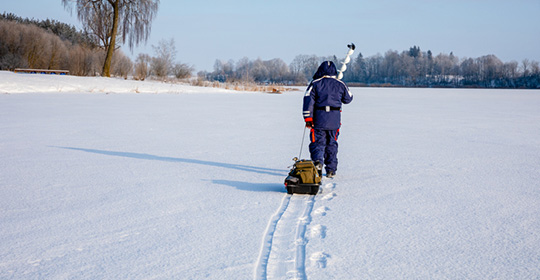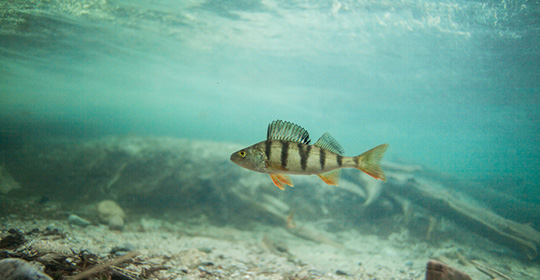How Do Fish Survive in Frozen Lakes?
By Debbie Hanson
Dec 20, 2022
How do fish survive in frozen lakes? Summary of ways fish metabolism, water temperature, water pressure contribute to fish survival through cold winter months
You might be asking yourself the question, “how do fish survive in frozen lakes?” Most anglers have probably wondered about this at one point or another. There are a few ways fish survive in frozen lakes. Learn about the roles that fish metabolism and water temperature play during the coldest winter months.
Most Lakes Don’t Freeze Down to the Bottom
How do fish live in frozen lakes? To begin to answer this question it’s important to understand that most lakes don't completely freeze all the way down to the bottom (unless they are very shallow). Colder water rises to the surface and warmer water sinks to the bottom. The water on the surface will freeze to form a layer of ice. Ice has the least density, which makes it float.

Water Pressure Prevents Freezing in Deeper Waters
In deep lakes, water pressure also contributes to the reasons why the surface freezes, but water stays liquid underneath. The weight of the water higher in the water column presses down on the water that is deeper. Another reason fish can live in frozen lakes is because the amount of pressure in deeper water doesn’t allow for the same expanding and rising as the water near the surface, which means the water at the bottom won’t freeze even though it may be at a freezing temperature.
Fish Metabolism Slows Down
What happens to fish in a frozen lake and how does it affect their metabolism? When a lake freezes, fish gather in schools in the deepest parts of a waterway and rest. When in a resting state, a fish’s heart rate slows down, the need for food and oxygen decreases, and activity decreases. In other words, metabolic functions slow down significantly during the winter. Fish will still eat, but they eat much less.
How do fish live in frozen lakes and feed during the winter? In cold climates, baitfish will swim into vegetative cover where they can hide and find food sources. Predatory fish, on the other hand, will slowly swim near these types of areas to look for a quick and easy baitfish meal. Some fish species, such as the brown bullhead catfish, bury themselves in the mud until weather and water temperatures rise in the spring.

Fish are Cold-Blooded Animals
Do fish die in frozen lakes or in lakes that are partially frozen? Since fish are cold-blooded animals, they can survive because they are able to regulate their body temperature to match their environment. However, they could die if a body of water freezes over completely and remains frozen for an extended period. While humans and other mammals are warm-blooded (have a consistent body temperature), cold-blooded creatures such as snakes, turtles and fish adapt their body temperature to their surroundings. The good news is that, in most cases, you won’t see fish frozen in a lake.









